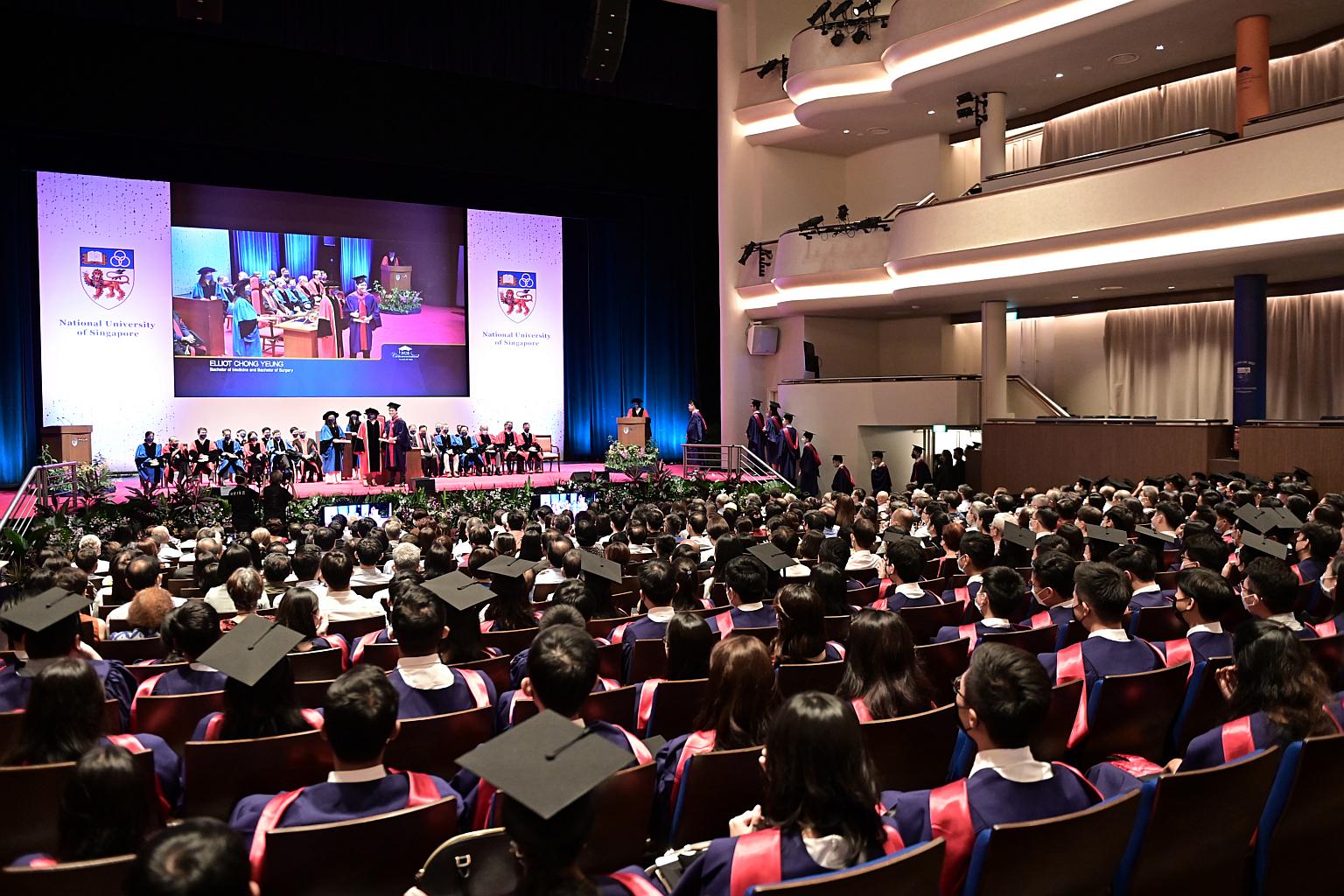Nearly 800 students receive degrees from NUS medical school amid Covid-19 challenges
Sign up now: Get ST's newsletters delivered to your inbox

Dr Ching Ann Hui (left) and Dr Yuki Ong were among 280 undergraduates from the NUS Yoo Long Lin School of Medicine who received their bachelor's degree.
PHOTO: NUS
Follow topic:
SINGAPORE - Sexual health and challenges faced by the transgender community do not usually come to mind when people think of the medical profession, but they are among important issues Dr Ching Ann Hui and Dr Yuki Ong hope to spotlight.
In 2019, they started health podcast Third Spacing, which takes its name from the medical term for the movement of fluid between cells and vessels.
The series has since racked up nearly 50 episodes covering such topics, and features doctors who have taken unconventional career paths such as going from running a private practice in Singapore to working in Afghanistan.
Dr Ching, 25, wants to improve marginalised populations' access to healthcare.
"As doctors, our work is focused on the body, and some of these topics will inevitably be messy. We have to be very cognisant of where our audience comes from, what their background is, and we work from there (to approach these issues)," she added.
She is one of more than 280 undergraduates from the National University of Singapore Yong Loo Lin School of Medicine who received their bachelor's degrees on Sunday (July 17).
Some 500 students from the school were also conferred graduate degrees that day, bringing NUS' 28 commencement ceremonies this year to a close. They include medical practitioners, biomedical scientists and healthcare administrators.
Manpower Minister Tan See Leng, an alumnus, said doctors should continually thirst for knowledge, explore new frontiers and stay true to the profession's values.
"Covid-19 was the crisis of your generation, but it will not be the last pandemic. Disease X will demand young people like you to be daring, imaginative and to pioneer breakthroughs in your respective fields," said Dr Tan, who was guest of honour at the postgraduate ceremony.
New healthcare innovations and technologies were developed at an unprecedented pace during the pandemic, he said, adding that researchers around the globe raced against time to work on Covid-19 vaccines and artificial intelligence was harnessed to develop predictive technologies that saved numerous lives.
Dr Tan reminded doctors about the importance of having strong principles.
"It may be tempting to fall back into the chase of the usual brass rings that society typically exhorts us to covet - fancy titles, bigger corner offices, more material possessions. This road may work for some, but it will come at huge costs and sacrifice, and it may also distract you from what is most important.
"Once you strip away the technological developments, healthcare is fundamentally a mortal enterprise. When you have a patient entrust their life to you, or when you see the labour of your work benefit countless others, then you will realise when medicine really becomes a fulfilling calling," he added.

Second Minister for Health Masagos Zulkifli, who was guest of honour at the undergraduate ceremony, said the Class of 2022 has persevered and succeeded despite challenges brought on by the pandemic, such as less on-site clinical training in healthcare institutions and more campus-based learning.
"As we move towards normalcy, it is timely for us to rethink what healthcare should look like, post-pandemic," said Mr Masagos, who is also Minister for Social and Family Development.
He added that doctors are at the heart of the Healthier SG movement, which aims to deliver more coordinated care.
"Many of you will be the first point of contact for Singaporeans. Beyond drug prescriptions and medical advice, you will have the responsibility of supporting patients in making healthier lifestyle choices," he said.
Dr Teo Yao Hao, who received his bachelor's degree and is currently a house officer at Singapore General Hospital, also hopes to make an impact through research.
The 25-year-old has had his research on topics such as sleep apnea published in more than 40 peer-reviewed journals.
He said: "When you treat a patient, you'll always be asking 'What else can I do for him? Is there anything better I can do to make sure he gets home earlier and doesn't come back to hospital so soon?' These are questions that we answer."

